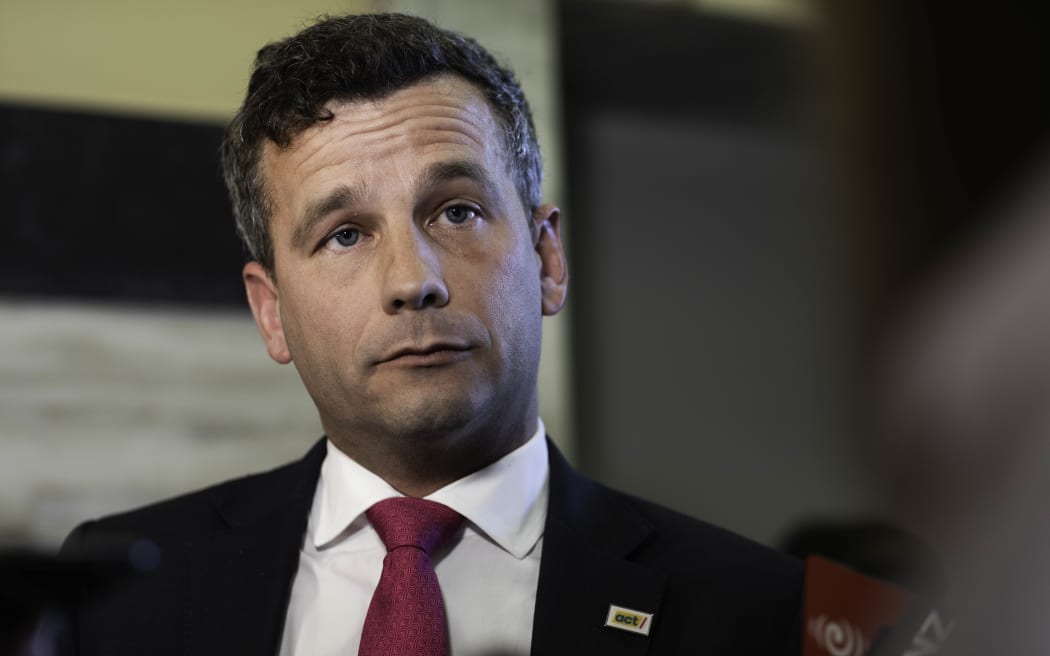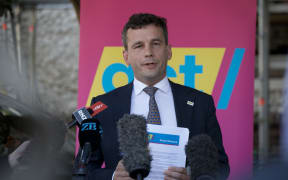
David Seymour says those who miss out on education are less able to participate in society as adults. Photo: RNZ / Angus Dreaver
Associate Education Minister David Seymour has warned that serious school truancy will leave an 80-year shadow of negative effects.
Appearing before the Education and Workforce Select Committee on Wednesday morning, Seymour said school absences were a very serious problem.
He said he was most concerned about the high number of students who were not enrolled in any school, and the 10-12 percent of students who were classed as chronically absent because they missed 30 percent or more of their classes.
"If we don't get these school attendance statistics up then we are going to find that there is going to be an 80-year shadow of people who missed out on education when they were young, less able to work, less able to participate in society, more likely to be on benefits. That's how serious this is," he said.
Seymour said he was working to get more accurate and frequent school attendance data which the government would publish as frequently as possible.
"People will be surprised," he said.
Education Minister Erica Stanford told the committee children's achievement would be her "North star", and she wanted 80 percent of children working at the expected curriculum level by the time they finished intermediate.
She said her focus would be on curriculum, teaching methods, and ensuring schools were testing children along the way.
Stanford and committee member Labour MP and former education minister Jan Tinetti agreed they needed to find common ground on education policy, especially on the use of tests to find out how children were performing.
Earlier in the week, Secretary for Education Iona Holsted told the committee politicians' policy flip-flops were partly to blame for achievement problems in schools.
Holsted said sudden and repeated changes to education policies contributed to problems with school children's achievement and she challenged political parties to find common ground.
"One of the things that I think goes to some of our achievement issues is the flip-flop ... national standards, no national standards, assessment no assessment ... You can't run a system like that. It's not fair on the people who work in it, it's certainly not fair on the kids who are in it."
Countries with more successful school systems than New Zealand had a level of shared agreement between political parties about education policy, Holsted said.
She also said she was disappointed at the lack of hard evidence of success from the Kahui Ako policy introduced by the National-led government in 2014 to pay some principals and teachers extra for leading collaboration within groups of schools.
"Probably a bit of a personal frustration can I say is the investment of Kahui Ako has not delivered the promise," she said.
"It was the largest single investment in the history, I think, of the New Zealand educational system, $325 million in the first year and $150m ongoing, with the sole intent of investing in teachers and leaders to collectively work across communities to strengthen the core."
Holsted said outcomes from the programme, which covered about 1800 schools in 221 groups, were variable.
Some Kahui Ako schools said the system had radically changed the way they worked, but test results showed the schools had the same achievement problems as other schools.
"At individual school level, at individual Kahui Ako level, there may well be some benefits being derived but for an investment that size it is disappointing," she said.
Holsted said principals told the ministry that they learned from each other when they had the opportunity to collaborate and many did that outside of the Kahui Ako system.
"But it's not system-wide. I think that how we build that system-wide collaborative leadership is really critical."
Also earlier in the week, Education Ministry deputy secretary Sean Teddy said the ministry would resume weekly measurement of school attendance in term two.
Weekly reporting stopped because it was time-consuming, but the ministry planned to use it to provide richer information to schools, Teddy said.
The ministry also hoped to use student ID numbers to figure out which attendance interventions were working best and also to spot patterns of absence that needed attention, he said.






